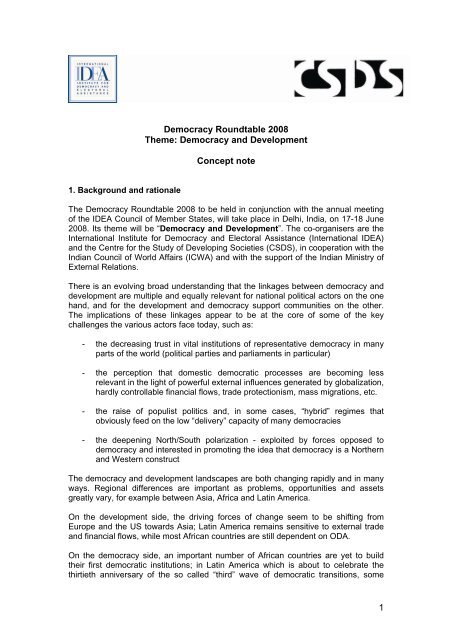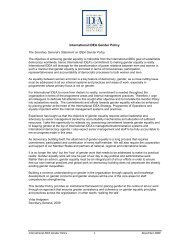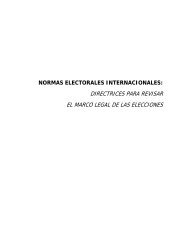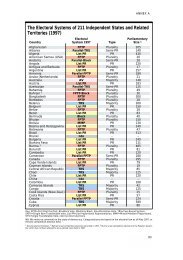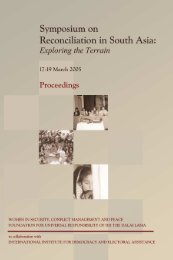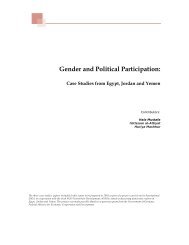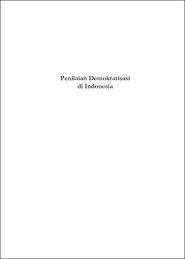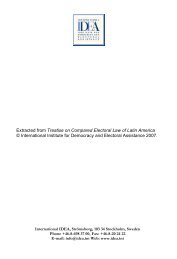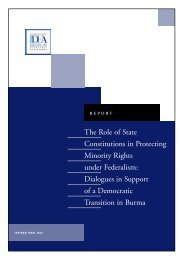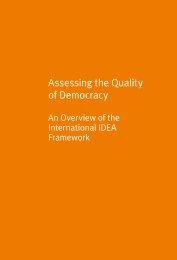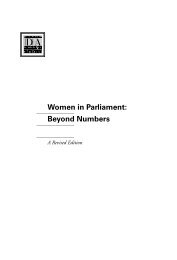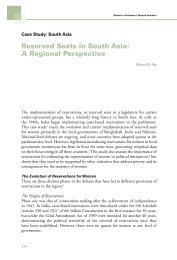Concept note of the Democracy Round Table ... - International IDEA
Concept note of the Democracy Round Table ... - International IDEA
Concept note of the Democracy Round Table ... - International IDEA
You also want an ePaper? Increase the reach of your titles
YUMPU automatically turns print PDFs into web optimized ePapers that Google loves.
<strong>Democracy</strong> <strong>Round</strong>table 2008<br />
Theme: <strong>Democracy</strong> and Development<br />
<strong>Concept</strong> <strong>note</strong><br />
1. Background and rationale<br />
The <strong>Democracy</strong> <strong>Round</strong>table 2008 to be held in conjunction with <strong>the</strong> annual meeting<br />
<strong>of</strong> <strong>the</strong> <strong>IDEA</strong> Council <strong>of</strong> Member States, will take place in Delhi, India, on 17-18 June<br />
2008. Its <strong>the</strong>me will be “<strong>Democracy</strong> and Development”. The co-organisers are <strong>the</strong><br />
<strong>International</strong> Institute for <strong>Democracy</strong> and Electoral Assistance (<strong>International</strong> <strong>IDEA</strong>)<br />
and <strong>the</strong> Centre for <strong>the</strong> Study <strong>of</strong> Developing Societies (CSDS), in cooperation with <strong>the</strong><br />
Indian Council <strong>of</strong> World Affairs (ICWA) and with <strong>the</strong> support <strong>of</strong> <strong>the</strong> Indian Ministry <strong>of</strong><br />
External Relations.<br />
There is an evolving broad understanding that <strong>the</strong> linkages between democracy and<br />
development are multiple and equally relevant for national political actors on <strong>the</strong> one<br />
hand, and for <strong>the</strong> development and democracy support communities on <strong>the</strong> o<strong>the</strong>r.<br />
The implications <strong>of</strong> <strong>the</strong>se linkages appear to be at <strong>the</strong> core <strong>of</strong> some <strong>of</strong> <strong>the</strong> key<br />
challenges <strong>the</strong> various actors face today, such as:<br />
- <strong>the</strong> decreasing trust in vital institutions <strong>of</strong> representative democracy in many<br />
parts <strong>of</strong> <strong>the</strong> world (political parties and parliaments in particular)<br />
- <strong>the</strong> perception that domestic democratic processes are becoming less<br />
relevant in <strong>the</strong> light <strong>of</strong> powerful external influences generated by globalization,<br />
hardly controllable financial flows, trade protectionism, mass migrations, etc.<br />
- <strong>the</strong> raise <strong>of</strong> populist politics and, in some cases, “hybrid” regimes that<br />
obviously feed on <strong>the</strong> low “delivery” capacity <strong>of</strong> many democracies<br />
- <strong>the</strong> deepening North/South polarization - exploited by forces opposed to<br />
democracy and interested in promoting <strong>the</strong> idea that democracy is a Nor<strong>the</strong>rn<br />
and Western construct<br />
The democracy and development landscapes are both changing rapidly and in many<br />
ways. Regional differences are important as problems, opportunities and assets<br />
greatly vary, for example between Asia, Africa and Latin America.<br />
On <strong>the</strong> development side, <strong>the</strong> driving forces <strong>of</strong> change seem to be shifting from<br />
Europe and <strong>the</strong> US towards Asia; Latin America remains sensitive to external trade<br />
and financial flows, while most African countries are still dependent on ODA.<br />
On <strong>the</strong> democracy side, an important number <strong>of</strong> African countries are yet to build<br />
<strong>the</strong>ir first democratic institutions; in Latin America which is about to celebrate <strong>the</strong><br />
thirtieth anniversary <strong>of</strong> <strong>the</strong> so called “third” wave <strong>of</strong> democratic transitions, some<br />
1
countries, particularly in <strong>the</strong> Andean region, are experiencing serious challenges in<br />
terms <strong>of</strong> both institutional stability and delivery. Finally, Asia presents a multi-facetted<br />
picture hosting at <strong>the</strong> same time <strong>the</strong> largest democracy <strong>of</strong> <strong>the</strong> world and populous<br />
countries where democracy is yet to be achieved or consolidated.<br />
Changes are also noticeable on <strong>the</strong> democracy support side as new actors are<br />
coming to <strong>the</strong> stage, such as private foundations and <strong>the</strong> corporate sector. All <strong>the</strong>se<br />
transformations are influencing <strong>the</strong> relationship between democracy and<br />
development. All <strong>of</strong> <strong>the</strong>m have a distinctly political nature, though <strong>the</strong> ongoing debate<br />
about <strong>the</strong> democracy-development nexus is both academic and political.<br />
2. <strong>Democracy</strong>-development linkages<br />
On <strong>the</strong> academic side, literature about <strong>the</strong> democracy-development linkages is both<br />
abundant and inconclusive. This is really not surprising if we consider that both<br />
development and democracy are understood in so many different ways. In a nutshell,<br />
some scholars have claimed that <strong>the</strong>re was a causal link. O<strong>the</strong>rs refuted its existence<br />
arguing that evidence was contradictory and that <strong>the</strong>re were plenty <strong>of</strong> examples to<br />
substantiate different, if not opposed views. Finally, some scholars recognize that <strong>the</strong><br />
link exists but is not direct and causal but somewhat more complex.<br />
Both terms have undergone a semantic evolution over <strong>the</strong> last couple <strong>of</strong> decades:<br />
Development used to be understood as <strong>the</strong> synonym <strong>of</strong> economic growth. Today, it<br />
still includes growth, but is also broadly understood as a process leading to a<br />
continuous improvement <strong>of</strong> <strong>the</strong> quality <strong>of</strong> life <strong>of</strong> <strong>the</strong> majority <strong>of</strong> <strong>the</strong> people, particularly<br />
<strong>the</strong> poor. It also incorporates <strong>the</strong> dimension <strong>of</strong> human rights – including civic and<br />
political rights and should ideally lead to <strong>the</strong> reduction <strong>of</strong> disparities in <strong>the</strong> distribution<br />
<strong>of</strong> income. The way we use <strong>the</strong> term democracy has also undergone important<br />
changes: from liberal democracy – concerned essentially with individual freedoms,<br />
electoral mechanisms and <strong>the</strong> non-interference <strong>of</strong> <strong>the</strong> state in <strong>the</strong> economy – towards<br />
participatory democracy and, some would say, also towards social democracy, not in<br />
<strong>the</strong> sense <strong>of</strong> <strong>the</strong> programme implemented by a specific political party, but as a<br />
system <strong>of</strong> governance expected to deliver on social and economic rights and<br />
development in <strong>the</strong> broadest sense.<br />
In spite <strong>of</strong> <strong>the</strong> ambiguous findings on <strong>the</strong> impact <strong>of</strong> democracy on growth and vice<br />
versa, <strong>the</strong>re is a growing consensus – almost a universal acceptance – <strong>of</strong> three<br />
points:<br />
o First, that both development and democracy are desirable – are values to be<br />
pursued in <strong>the</strong>mselves;<br />
o Second, that development is more than economic growth;<br />
o Third, that democracy is more than <strong>the</strong> institutions and <strong>the</strong> mechanics <strong>of</strong><br />
democracy i.e. that democracy is also expected to deliver in terms <strong>of</strong> a better<br />
quality <strong>of</strong> life.<br />
Thus, we may say that <strong>the</strong>re has been a converging evolution <strong>of</strong> <strong>the</strong> two terms<br />
towards each o<strong>the</strong>r: democracy is more and more meant to include development and<br />
development is more and more meant to include <strong>the</strong> realization <strong>of</strong> basic human<br />
rights, including, <strong>of</strong> course, civic and political rights.<br />
On <strong>the</strong> political side too, while both democracy and development are seen as values<br />
“per se” – pursued for <strong>the</strong>ir own sake – it is becoming increasingly evident that<br />
2
democratic institutions and processes, in order to be sustainable, need to deliver: to<br />
generate development, better public services and improved “quality <strong>of</strong> life”. In o<strong>the</strong>r<br />
terms, democracy, besides being “<strong>the</strong> freedom <strong>of</strong> choice” is also expected to provide<br />
“freedom from want”, i.e. development.<br />
On <strong>the</strong> o<strong>the</strong>r hand, national development priorities, in order to genuinely reflect<br />
citizens’ needs and expectations, should be shaped and implemented through<br />
effective democratic processes that engage a broad spectrum <strong>of</strong> political actors –<br />
political parties and legislators in <strong>the</strong> first place.<br />
The importance <strong>of</strong> <strong>the</strong>se linkages has been grasped by <strong>the</strong> international community,<br />
including most bilateral development cooperation agencies, <strong>the</strong> OECD’s<br />
Development Assistance Committee, development organizations such as <strong>the</strong> World<br />
Bank, etc.<br />
This is reflected in <strong>the</strong> fact that good governance has been included in <strong>the</strong> Millennium<br />
Development Goals and also in <strong>the</strong> fact that democratic governance is <strong>of</strong>ten included<br />
as an important criterion for aid allocation.<br />
3. Inclusive national ownership through political processes<br />
The impact <strong>of</strong> globalisation on <strong>the</strong> one hand and <strong>the</strong> dynamics <strong>of</strong> some international<br />
cooperation mechanisms on <strong>the</strong> o<strong>the</strong>r, seem to have rendered <strong>the</strong> concept <strong>of</strong><br />
“national ownership” in development more difficult to define and more challenging to<br />
implement.<br />
National development processes have become a function <strong>of</strong> multiple domestic and<br />
external influences, <strong>the</strong> latter ranging from changing terms <strong>of</strong> trade to volatile<br />
financial markets, to shifting investment opportunities and to uneven security<br />
situations.<br />
Development cooperation mechanisms currently based on <strong>the</strong> “poverty reduction<br />
strategy processes” (PRSPs) have gone a long way to address <strong>the</strong> issue <strong>of</strong> national<br />
ownership <strong>of</strong> development priorities <strong>of</strong> partner countries. The “recipes” <strong>of</strong> <strong>the</strong> nineties<br />
(embodied in <strong>the</strong> “structural adjustment policies”) are no longer considered valid and<br />
have evolved from advocating “a minimum <strong>of</strong> government” towards advocating<br />
“accountability and responsiveness” <strong>of</strong> government – in o<strong>the</strong>r terms “good<br />
governance”. The emphasis today is on sound public policies, accountability,<br />
poverty-reduction, and above all, national ownership <strong>of</strong> development policies.<br />
However, national ownership is still too <strong>of</strong>ten interpreted as ownership by <strong>the</strong><br />
executive branch <strong>of</strong> <strong>the</strong> government. PRSPs and o<strong>the</strong>r instruments are essentially<br />
negotiated and agreed between executive branches <strong>of</strong> governments, as <strong>the</strong>y do<br />
represent <strong>the</strong> respective countries in negotiating international and bilateral<br />
agreements. This basic fact should not, however, lead to a reduced scope for a real<br />
internal democratic debate on national development agendas. An excessive<br />
emphasis on <strong>the</strong> executive branch may undermine <strong>the</strong> functions <strong>of</strong> o<strong>the</strong>r actors in<br />
political systems, parliaments and political parties in <strong>the</strong> first place.<br />
In polarized political environments, not least in post conflict situations, applying <strong>the</strong><br />
principle <strong>of</strong> ownership essentially through ministries and high executive <strong>of</strong>ficers <strong>of</strong><br />
finance or planning may risk exacerbating <strong>the</strong> polarization. If in <strong>the</strong> eyes <strong>of</strong> <strong>the</strong><br />
political opposition, <strong>the</strong> international community is seen as caring for <strong>the</strong> government<br />
party only, it will be hard to avoid a “winner takes all” political culture in which being in<br />
government means access to big resources while being in opposition means trying to<br />
3
lock whatever effort <strong>the</strong> government makes, and trying to reap <strong>the</strong> benefits <strong>of</strong> <strong>of</strong>fice<br />
at <strong>the</strong> next elections. The space for nationally owned, broad-based visions for<br />
development may thus be hard to achieve, and <strong>the</strong> international community may,<br />
inadvertently and paradoxically, be part <strong>of</strong> <strong>the</strong> reason why. The problem has been<br />
identified on both sides <strong>of</strong> <strong>the</strong> North/South divide and <strong>the</strong>re are debates on how to<br />
overcome it.<br />
For democracy to grow and be consolidated in developing countries, national political<br />
society – political parties and legislators – need to assume a key role in <strong>the</strong> shaping<br />
and approval <strong>of</strong> national developmental agendas. They need to translate citizens’<br />
expectations into coherent developmental programmes.<br />
The ongoing debate in international fora testifies to <strong>the</strong> surfacing <strong>of</strong> new approaches<br />
that take into account not only <strong>the</strong> close inter-linkages between democracy and<br />
development support, but also <strong>the</strong> eminently political nature <strong>of</strong> both processes.<br />
4. Structure and key issues on <strong>the</strong> agenda<br />
The 2008 <strong>Round</strong>table on <strong>Democracy</strong> and Development will bring toge<strong>the</strong>r a group <strong>of</strong><br />
key scholars from different parts <strong>of</strong> <strong>the</strong> world, authors and policy practitioners, to<br />
debate on <strong>the</strong> challenges ahead, to inspire <strong>the</strong> thinking and, possibly, <strong>the</strong><br />
development <strong>of</strong> related policies <strong>of</strong> member states, and to contribute forging a more<br />
supportive mutual relationship between development and democracy support at<br />
global level.<br />
The <strong>Round</strong>table will seek to address three dimensions <strong>of</strong> <strong>the</strong> challenge, i.e.:<br />
- The role <strong>of</strong> <strong>the</strong> “political society” – parties, parliaments and o<strong>the</strong>r actors in<br />
developing countries in developing policy proposals geared towards<br />
sustainable development and effective poverty reduction – while holding <strong>the</strong>ir<br />
executives accountable for <strong>the</strong> implementation <strong>of</strong> such policies and while<br />
being <strong>the</strong>mselves accountable to <strong>the</strong>ir citizens.<br />
- The role <strong>of</strong> <strong>the</strong> international community in contributing to <strong>the</strong> opening <strong>of</strong><br />
broader spaces for “political society” in developing countries in <strong>the</strong> shaping <strong>of</strong><br />
national development priorities and poverty reduction strategies<br />
- The impact <strong>of</strong> globalization on democracy - as an opportunity for building<br />
more open democratic societies whose citizens are aware <strong>of</strong> global<br />
challenges, but also, as an external force difficult to control through<br />
established national institutions <strong>of</strong> democracy.<br />
These three facets <strong>of</strong> <strong>the</strong> nexus are proposed as <strong>the</strong>mes for <strong>the</strong> two <strong>Round</strong>table<br />
panels:<br />
o Panel A: Development: An ideal? An electoral slogan? A sine qua non <strong>of</strong><br />
democracy?<br />
o Panel B: “Room for politics!” Democratizing national ownership in<br />
development.<br />
o Panel C: “<strong>Democracy</strong>: The Impact <strong>of</strong> Globalization”<br />
4


